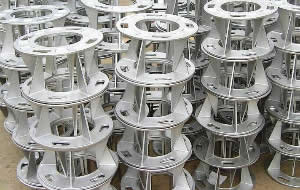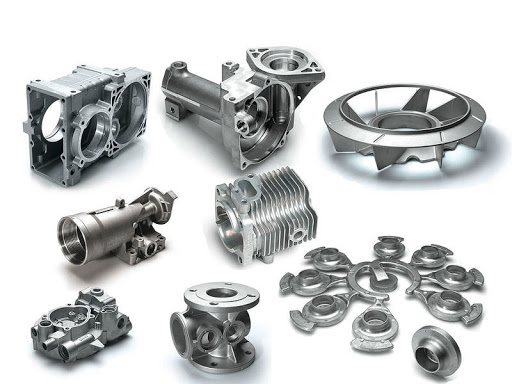How Aluminum Castings enhance product performance in modern industries
Wiki Article
Uncovering the Crucial Applications of Aluminum Castings Throughout Various Markets
Aluminum castings play a necessary duty in several industries. Their resilient and lightweight characteristics add to developments in automotive and aerospace fields. Furthermore, they enhance building and construction integrity and customer product design. As sustainability becomes a top priority, the environmental benefits of aluminum spreadings additionally highlight their significance. Comprehending the extensive applications of this product can disclose insights into contemporary production practices. What specific advancements are being made in these numerous industries?Automotive Industry Innovations

Aluminum castings play a crucial duty in electrical automobiles, where weight decrease is extremely important for battery performance. With the assimilation of light weight aluminum in engine blocks, transmission real estates, and architectural components, car manufacturers can achieve superior durability while preserving peak efficiency. As the need for effective and sustainable lorries grows, the auto sector remains to embrace light weight aluminum casting innovations, positioning itself at the forefront of technical advancements and environmental duty.
Aerospace Advancements
While the aerospace sector constantly looks for means to boost efficiency and efficiency, innovations in aluminum spreadings have actually arised as a critical variable in attaining these goals. The lightweight nature of light weight aluminum considerably adds to fuel effectiveness, minimizing overall airplane weight without compromising structural honesty. Innovations in casting techniques, such as die spreading and financial investment casting, permit for complex styles that enhance the rules of aerodynamics and efficiency.In addition, developments in metallurgy have improved the strength and corrosion resistance of aluminum alloys, making them suitable for various aerospace applications, consisting of engine parts and fuselage structures. The capability to create complex forms decreases the variety of parts called for, enhancing assembly procedures and lessening upkeep requirements. As aerospace manufacturers increasingly turn to light weight aluminum spreadings, they are finding that these innovations not just drive functional efficiency however additionally sustain sustainability goals through decreased energy consumption during flight.
Construction Applications
Aluminum spreadings play a critical function in the building market, using a mix of toughness, durability, and lightweight homes that improve structural stability. Aluminum Castings. These spreadings are utilized in a variety of applications, including window frameworks, door frames, and roofing systems, where their resistance to rust and weathering is particularly helpful. Additionally, aluminum spreadings add to energy performance, as their light-weight nature lowers the overall load on frameworks, facilitating easier transport and installationAdditionally, the adaptability of light weight aluminum enables complicated geometries and detailed designs, conference aesthetic needs without endangering architectural efficiency. In seismic regions, aluminum spreadings can be employed in essential structural components, offering considerable benefits concerning versatility and strength. On the whole, making use of light weight aluminum castings in building and construction not only improves the performance of structures but likewise supports sustainable building methods by making it possible for making use of recyclable products in construction projects.

Durable Goods Production
In durable goods producing, light weight aluminum spreadings play a critical role in lightweight product design, enabling less complicated handling and boosted performance. Their improved sturdiness functions contribute to the longevity and dependability of everyday products. This combination of advantages makes light weight aluminum a preferred product in the competitive consumer goods market.Lightweight Product Layout
As suppliers increasingly focus on efficiency and sustainability, lightweight item layout has emerged as a vital facet of customer items development. The combination of aluminum spreadings permits developers to develop products that are not just lighter yet likewise extra energy-efficient. This reduction in weight contributes to lower transportation costs and enhanced individual experience, as consumers progressively look for easier-to-handle goods. Furthermore, lightweight styles facilitate ingenious visual appeals, enabling brand names to differentiate themselves in an affordable market. The convenience of aluminum permits detailed forms and kinds, enhancing total layout liberty. Consequently, lightweight item layout is coming to be vital for firms aiming to meet contemporary customer needs while sticking to environmental considerations. This fad is improving how items are conceived and produced across different industries.Improved Sturdiness Functions
While modern-day customers require items that are both lightweight and visually pleasing, enhanced durability features have become just as crucial in customer items making. Aluminum castings provide outstanding strength-to-weight ratios, permitting producers to create products that stand up to day-to-day damage. The fundamental corrosion resistance of light weight aluminum assurances that items keep their appearance and performance in time, reducing the requirement for frequent replacements. Additionally, casting methods make it possible for the manufacturing of smooth styles that improve structural integrity. As a result, suppliers can deliver durable goods that not just fulfill performance expectations yet also supply durability. This focus on sturdiness not just enhances customer basics complete satisfaction but also straightens with sustainability objectives by decreasing waste and promoting accountable intake.Electric and Electronics Sector
The electrical and electronics field significantly relies on light weight aluminum spreadings for their lightweight, long lasting, and extremely conductive homes. These spreadings are essential in manufacturing numerous elements, including real estates, you could try here enclosures, and warm sinks. Their reduced thickness permits lowered overall weight in digital gadgets, improving mobility without jeopardizing efficiency. Additionally, aluminum's superb thermal conductivity is crucial for dissipating warmth created by electronic parts, guaranteeing excellent operating and long life.Light weight aluminum castings provide excellent deterioration resistance, which is critical for maintaining electronic integrity in different atmospheres. The capacity to create complicated forms and complex layouts via spreading methods additionally supports innovation in product growth, permitting producers to meet details technological needs. As the demand for energy-efficient and high-performance electronic tools proceeds to grow, aluminum spreadings are placed as a key material, assisting in innovations in technology throughout the market. Their convenience and dependability make them vital in the modern-day electric and electronic devices landscape.
Sustainability and Environmental Effect
Recognizing the expanding concern for ecological sustainability, the light weight aluminum spreading industry has actually made substantial strides in decreasing its eco-friendly impact. The manufacturing of light weight aluminum spreadings currently progressively utilizes recycled materials, lessening energy intake and raw material extraction. This change not only conserves resources however also lowers greenhouse gas emissions connected with main light weight aluminum production.
Additionally, improvements in innovation have caused more effective casting procedures, further lowering waste and enhancing energy efficiency. Lots of producers are adopting lasting techniques such as closed-loop systems that reuse water and decrease hazardous waste.
Aluminum's light-weight nature improves fuel efficiency in transportation sectors, adding to lower discharges over the lifecycle of automobiles. As the market remains to introduce and focus on sustainability, aluminum castings are poised to play a vital duty in promoting ecologically accountable practices throughout various fields, lining up with global initiatives to combat environment modification and advertise sustainable growth.
Often Asked Questions
What Are the Benefits of Aluminum Castings Over Other Materials?
Aluminum castings supply lightweight properties, outstanding corrosion resistance, and excellent thermal conductivity. Furthermore, they allow elaborate designs, lower production expenses, and provide improved sturdiness, making them useful contrasted to standard products like steel or iron.How Are Light Weight Aluminum Castings Produced?
Light weight aluminum spreadings are generated through processes like sand spreading, die spreading, and financial investment spreading. anchor Molten light weight aluminum is poured right into molds, allowed to cool down, and then removed, causing accurate and durable parts for different applications.What Is the Typical Life-span of Light Weight Aluminum Castings?
The normal life-span of aluminum spreadings ranges 10 to half a century, depending on environmental factors, usage problems, and alloy structure. Appropriate maintenance and care can greatly extend their longevity and performance in different applications.Can Light Weight Aluminum Castings Be Recycled?
Yes, aluminum spreadings can be reused efficiently (Aluminum Foundry). The recycling procedure retains the metal's residential properties, making it a lasting option for various applications, consequently adding to ecological conservation and source monitoring within multiple marketsWhat Industries Are Emerging for Aluminum Spreading Applications?
Arising sectors for aluminum casting applications consist of electrical vehicle manufacturing, sustainable power industries, aerospace improvements, and clinical modern technology. These sectors take advantage of light weight aluminum's light-weight, durable residential properties to improve and innovate performance in different products and systems.While the aerospace industry constantly looks for methods to boost efficiency and efficiency, developments in aluminum castings have emerged as a vital factor in accomplishing these goals. Aluminum castings play a crucial duty in the building and construction industry, using a combination of strength, durability, and light-weight residential or commercial properties that enhance architectural integrity. In customer goods making, light weight aluminum spreadings play a vital role in lightweight item style, allowing for less complicated handling and boosted efficiency. The electric and electronic devices industry progressively relies on aluminum castings for their light-weight, long lasting, and highly conductive homes. Aluminum castings are generated with procedures like sand spreading, pass away spreading, and investment spreading.
Report this wiki page